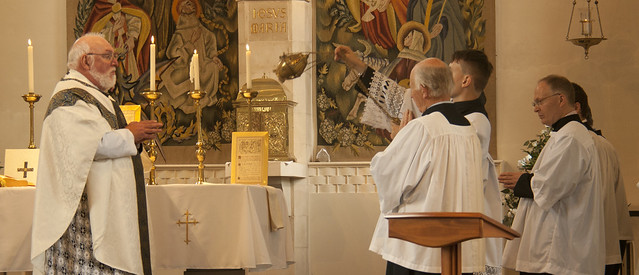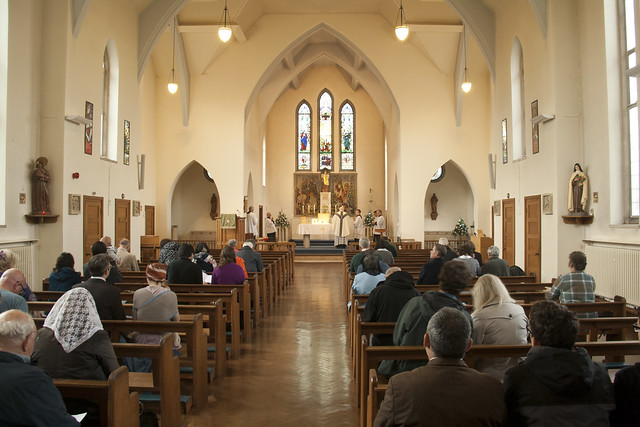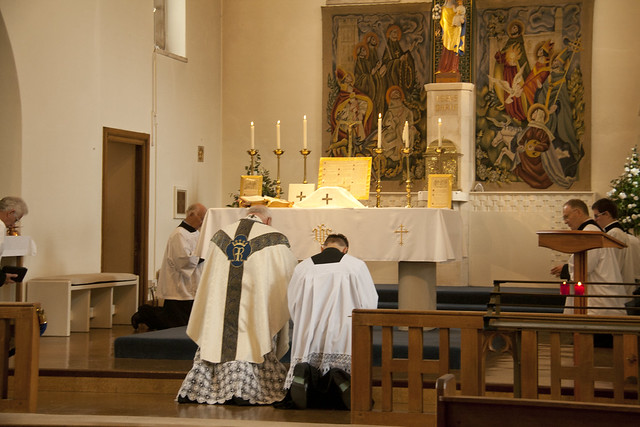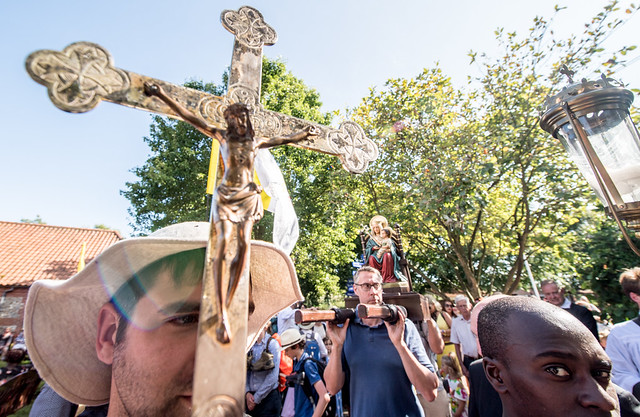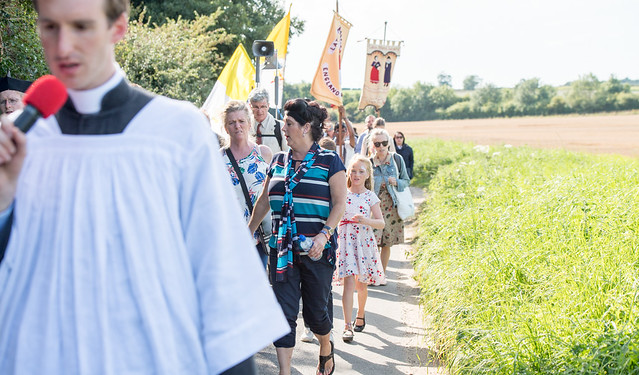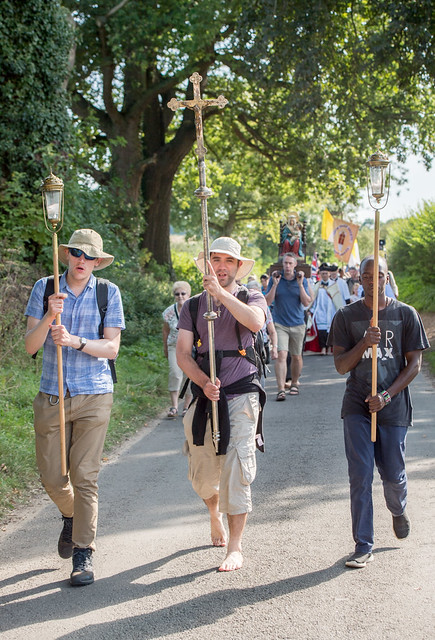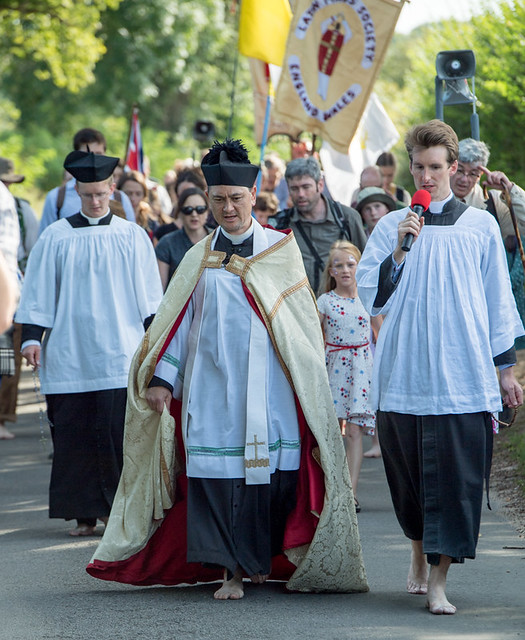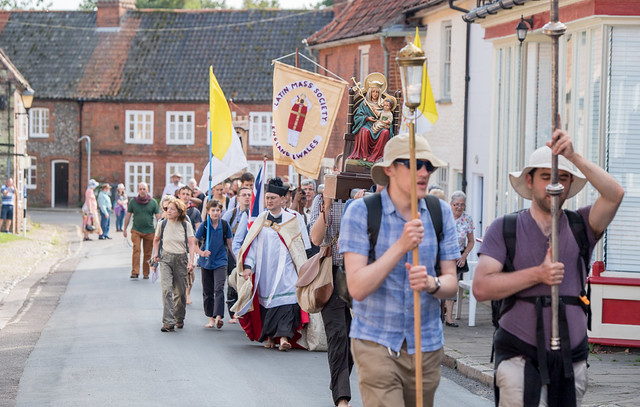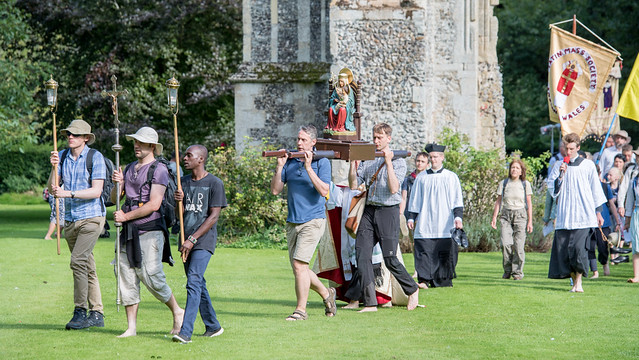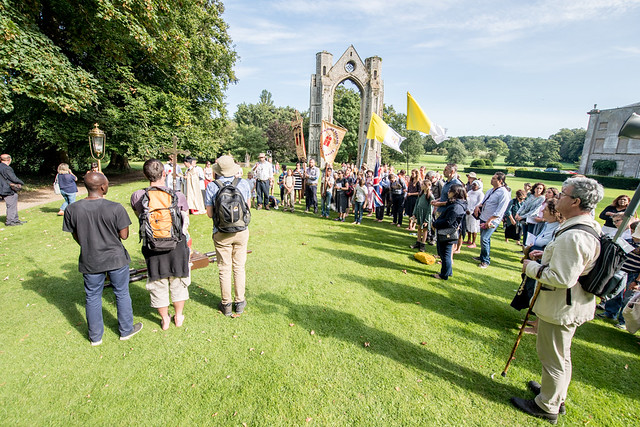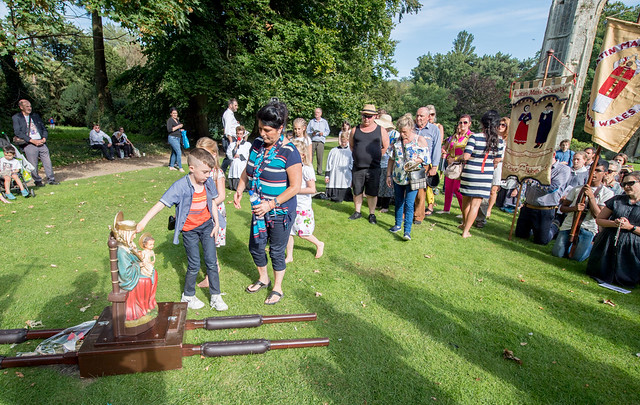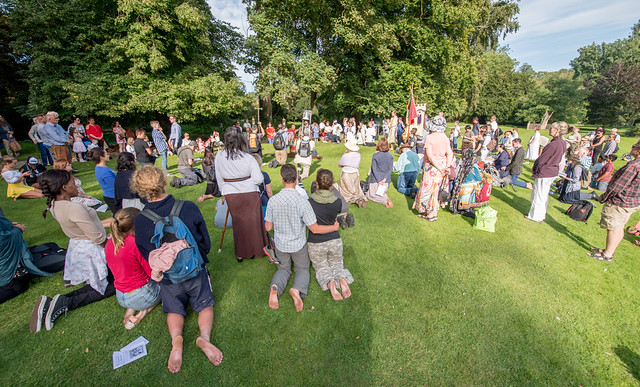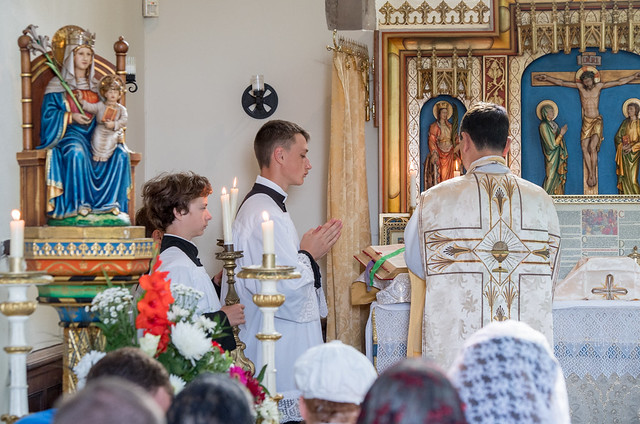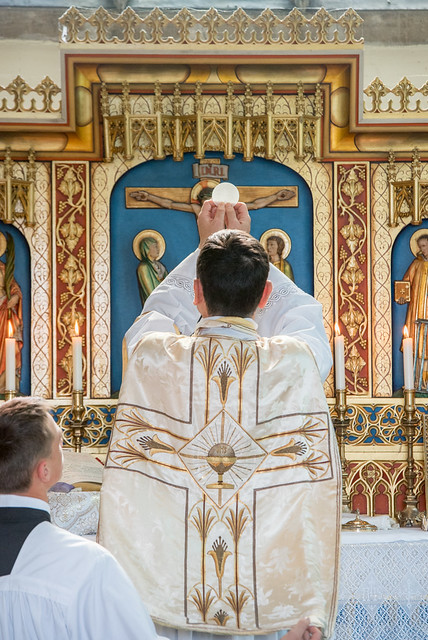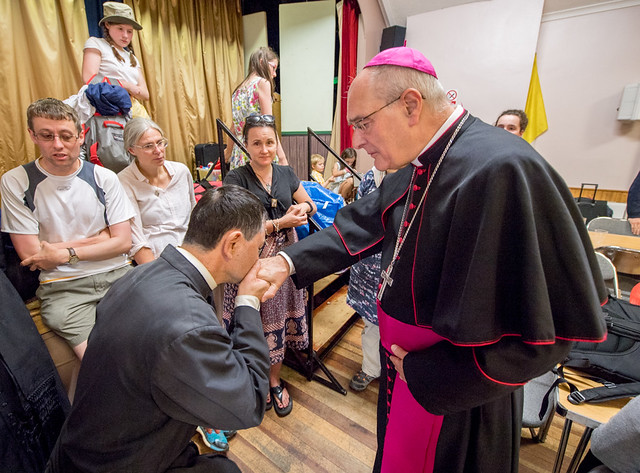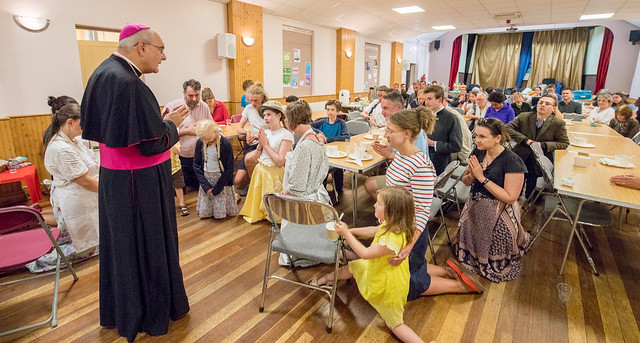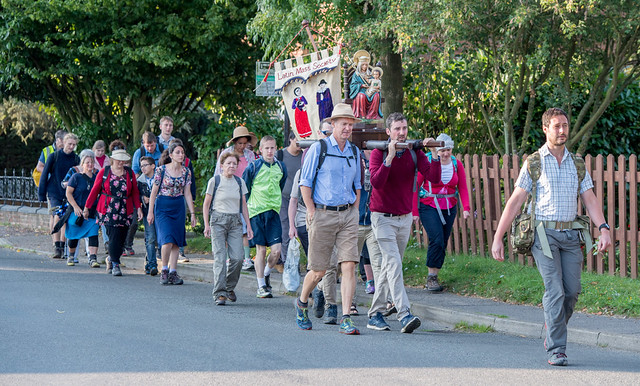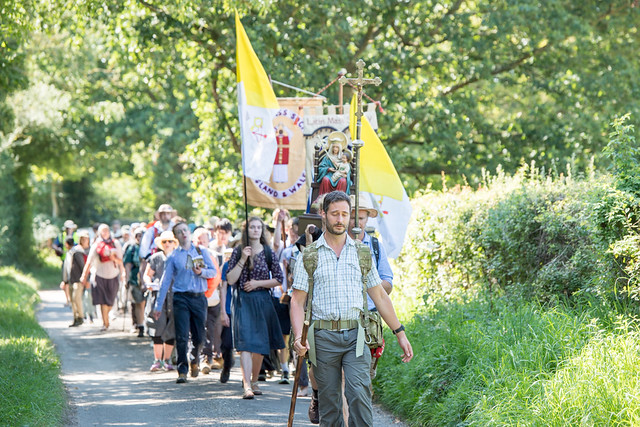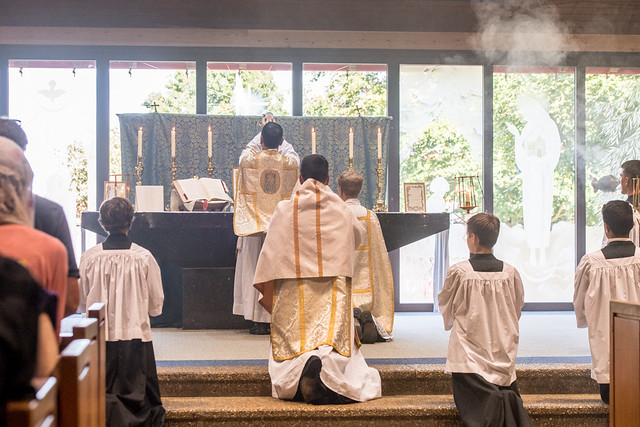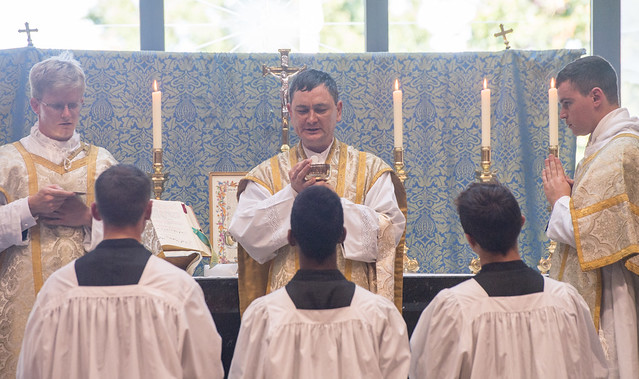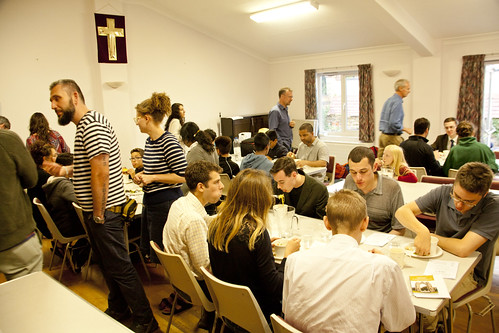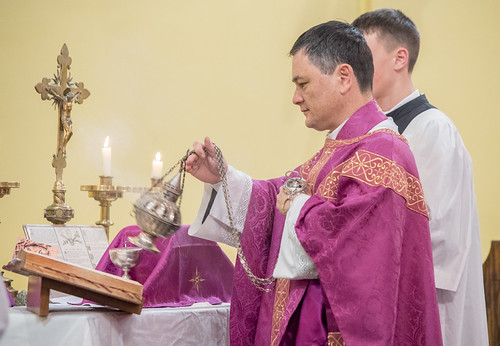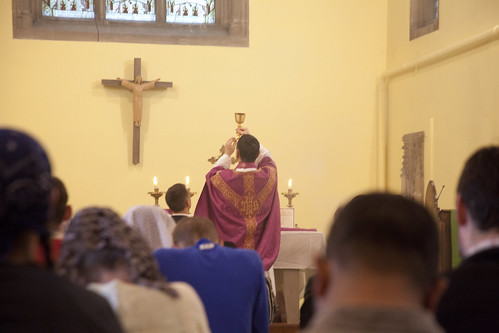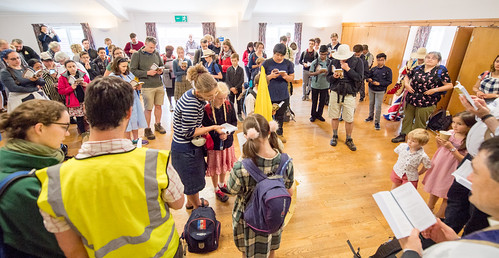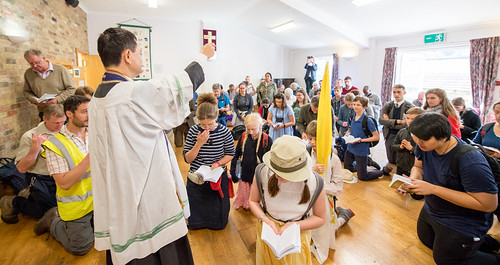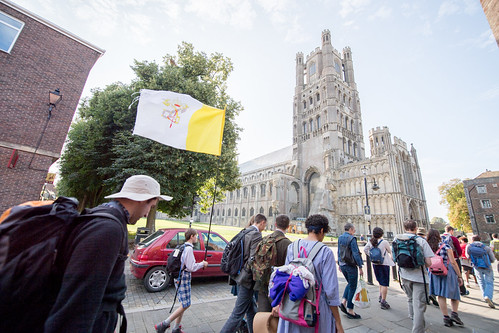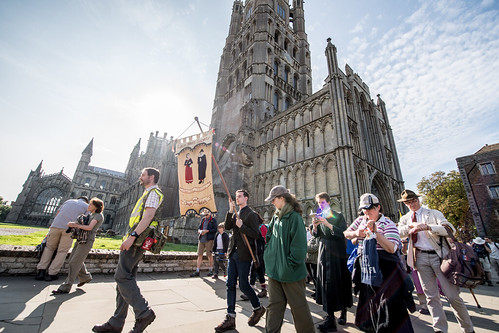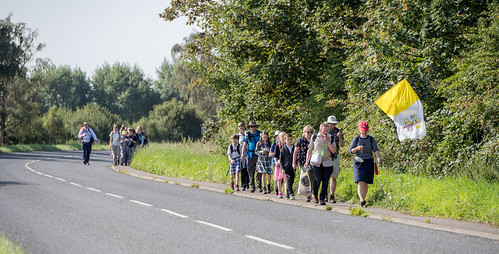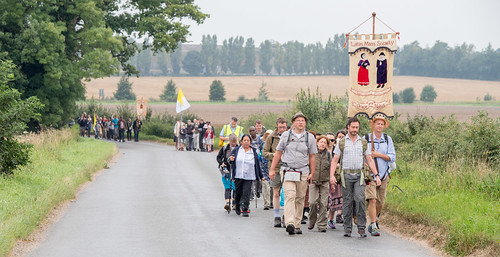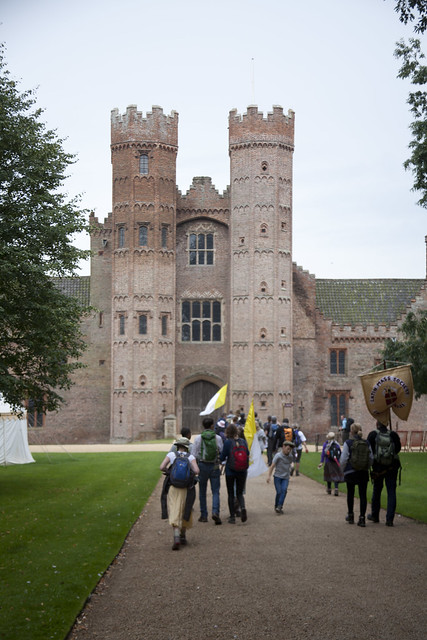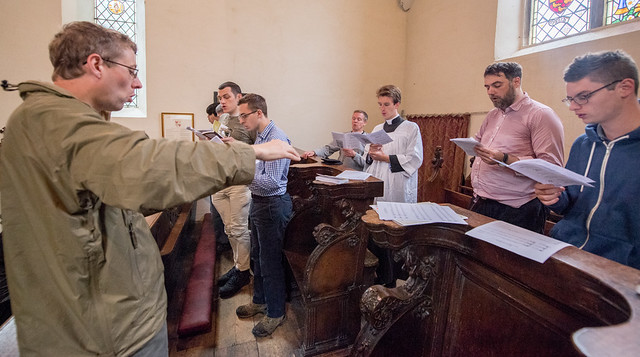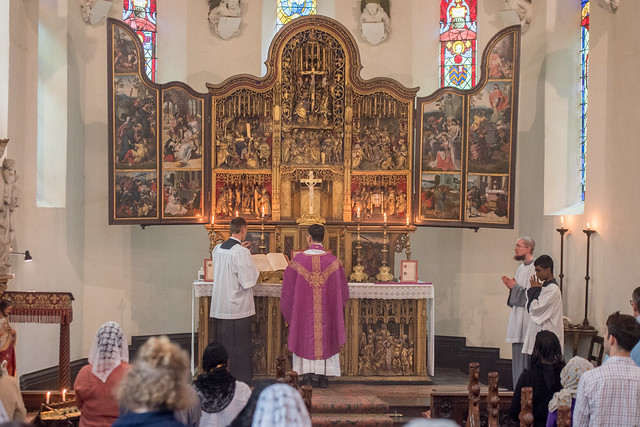Chairman's Blog
LMS Pilgrimage to Glastonbury
This year I was able to get to the Latin Mass Society's longstanding pilgrimage to Glastonbury, one of the ancient holy places of Europe. It generally takes place on the first Saturday of September.
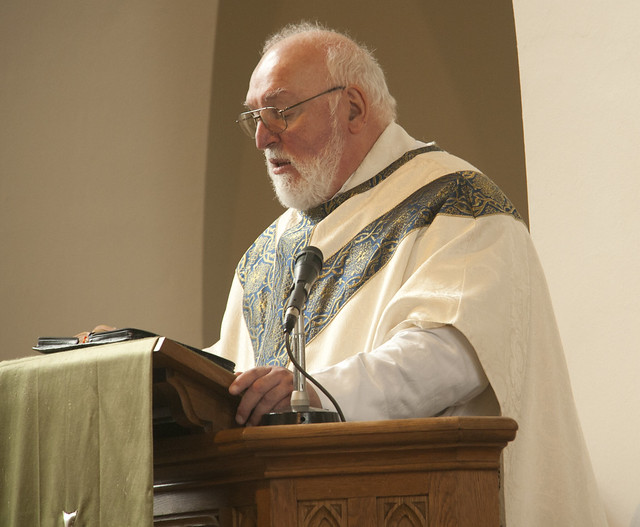
A Sung Mass was celebrated by Fr Philip Thomas. By coincidence, it has been announced that another priest of Clifton who has done much for the Traditional Mass, Fr Bede Rowe, will be taking over as Parish Priest of Glastonbury.
Support the work of the LMS by becoming an 'Anniversary Supporter'.
Cardinal Sarah's proposed reform of the Traditional Mass
New Council elected by Una Voce International
I attended the 'closed' or business meeting of Una Voce International - the Foederatio Internationalis Una Voce, FIUV - which takes place every two years and elects (or re-elects) the organisation's officers and Council.
Like most voluntary organisations, the FIUV is never overwhelmed by people wanting to take on positions of responsibility. We are very grateful to Felipe Alanis Suarez (from Mexico) for agreeing to do another term as President, and to Monika Rheinsmitt for carrying on as Treasurer. I agreed to be Secretary, a post I have not undertaken before. (I was Treasurer 2013-'15.)
Apart from the usual and, often in their most interesting aspects, confidential contact with the Curia, and the development of the organisation (such as the admission of new members), the big news of this year's General Assembly is the publication of the history of the FIUV by Leo Darroch, from the beginning (1965) up to the resignation of Michael Davies as President in 2002. It is a substantial work and I'll be writing reviews of it in various formats soon: buy it from the LMS bookshop here.
Here is the full list of Officers an pd Council members of the FIUVl
President: Felipe Alanís Suárez (Una Voce México)
President d'Honneur: Jacques Dhaussy (Una Voce France)
Vice Presidents: Patrick Banken (Una Voce France)
Secretary: Joseph Shaw (Latin Mass Society, England and Wales)
Councillors:
Oleg-Michael Martynov (Una Voce Russia)
Jarosław Syrkiewicz (Una Voce Polonia)
Derik Castillo (Una Voce México)
Andris Amolins (Una Voce Latvija)
Fabio Marino (Una Voce Italia)
Support the work of the LMS by becoming an 'Anniversary Supporter'.
Photos from Walsingham, Part 3
After Mass in the Reconciliation Chapel, we walked in procession down the Holy Mile, the last mile to the site of the Medieval shrine, destroyed at the Reformation.
The remains of Walsingham Priory
Venerating the processional statue
On Monday morning, some of us returned to the Catholic Shrine for a Sung Mass in the tiny Slipper Chapel.
Support the work of the LMS by becoming an 'Anniversary Supporter'.
Photos from Walsingham, Part 2
On Saturday, we stop at the ruins of Castle Acre Priory, and say the De Profundis.
On Saturday evening, at our evening stop of Great Massingham, we were visited by Bishop Alan Hopes, who is of course the lcoal Ordinary: Bishop of East Anglia.
Off again, for the last day's walk: Sunday. Now with a processional statue of Our Lady of Walsingham.
Mass in the Reconciliation Chapel at the Catholic Shrine: High Mass, a Votive of Our Lady with the Asperges. 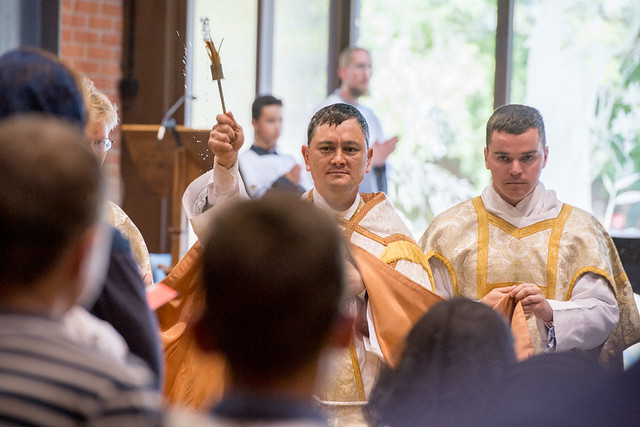
Fr Rowe was assisted by Fr Henry Wisenant (deacon; a priest of the diocese) and Br Ambrose (subdeacon, of the Cardiff Oratory). 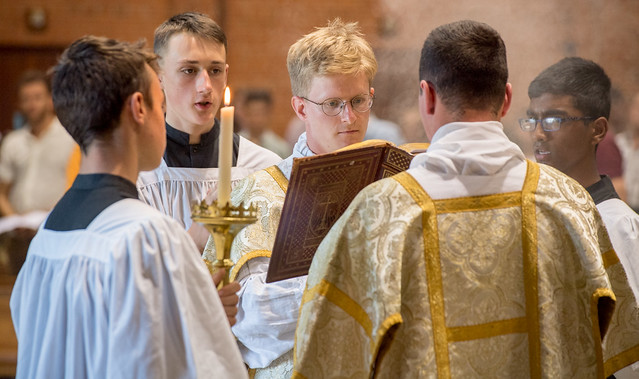
Support the work of the LMS by becoming an 'Anniversary Supporter'.
Photos from Walsingham: Part 1
Most of these photos are by John Aron, our brilliant photographer; a couple are by me.
The pilgrimage was brilliant, and the numbers were our highest ever. I'm going to let the photos do the talking.
Gathering on Thursday evening: dinner.
Mass early on Friday morning, celebrated by Fr Michael Rowe
Fr Michael Rowe our Chaplain gives the Blessing of Pilgrims
Visit to Ely Cathedral
Walking out of Ely
Early start on Saturday, to get to Oxburgh for Mass
Oxburgh Hall, a recusant Catholic house
Support the work of the LMS by becoming an 'Anniversary Supporter'.
A new liturgy war? Magnum principium
Support the work of the LMS by becoming an 'Anniversary Supporter'.
Pontifical Mass in St Bede's, Thurs 28th Sept
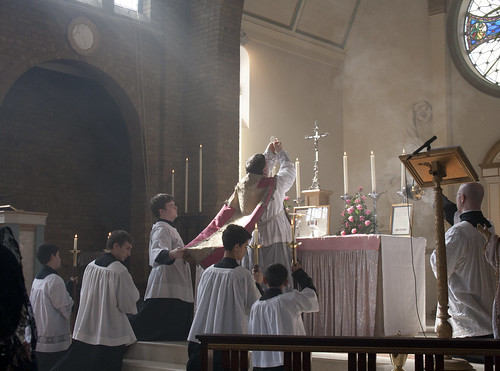 |
| Laudete Sunday Mass at St Bede's |
Pontifical Mass at the Faldstool will be celebrated
What Rees-Mogg could have said
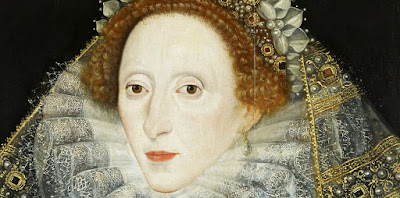 Every Catholic politician from Parish Councillor up needs to have a rehearsed answer to the 'bloody questions' of today, just as the Jesuits and seminary priests of penal times had a rehearsed answer to the 'bloody question' of penal times (viz.: if the Spaniards invaded to topple Queen Elizabth, who would you support?).
Every Catholic politician from Parish Councillor up needs to have a rehearsed answer to the 'bloody questions' of today, just as the Jesuits and seminary priests of penal times had a rehearsed answer to the 'bloody question' of penal times (viz.: if the Spaniards invaded to topple Queen Elizabth, who would you support?).
Today's 'bloody questions' are these:
Is gay sex a sin?
Would you force a woman pregant from incestuous rape to continue with the pregnancy?
The thing about such questions is that they are framed in a slanted way, but if you refuse to answer, it will look not only weasally but also a tacit admission that you hold the most unpopular views possible. In answering them, you have to try to reframe it, but you have to do this in a few words, before you get interrupted. You have about ten seconds, and each ten-second statement must make sense on its own.
I don't claim to be an expert on media engagement - though I have been in the hotseat a handful of times. The point of this post is not to criticise anyone who has no time to think under pressure, but to make some suggestions about how we can think about these things when we do have the chance: in advance.
So, Mr Shaw, is gay sex a sin?
Answer: Sexuality finds its fulfilment within marriage. The fruits of sexuality include the relationship of the couple and children, and these both work best within marriage. Yes I'm talking about heterosexual marriage.
I'd probably be interupted at this point. If they haven't changed the question completely, carry on.
For this reason sex outside the marriage is problematic.
Ditto.
Morality is not a set of arbitrary rules designed to make our lives difficult. It is about what is ultimately satisfying and fulfilling. I believe that sex outside marriage is bad for people.
What do you say to homosexuals who find fulfillment a loving, stable, long-term relationship?
Other homosexuals think that for their integrity and peace they need to live celibate lives. Others again have multiple partners. It is obvious which ones I agree with.
Now like Jacob Rees-Mogg I have refused to use the form of words which the hostile interviewer wants to put in my mouth: 'gay sex is a sin'. It's not because I (or Rees-Mogg) don't want to affirm this proposition, it is because using those words affirms the interviewer's frame. Once you have said those words, no one has any reason to listen to you any more: you are obviously a bigot.
So, Mr Shaw, you would force a woman pregnant from incesuous rape to have the baby?
The rapist puts this woman into a terrible dilemma: to continue with the pregnancy, or to kill her own child. But killing the child cannot be the way to come to terms with this. It adds another trauma to the trauma of rape.
Don't you think the woman should be allowed to choose what to do?
Women in this situation have all sorts of people offering them advice and help. In practice they are encouraged to have an abortion. Everyone assumes that's what should happen; friends and family often find it easier. But it is the wrong answer. It isn't so easy for the woman, or for the child.
A follow up question (which can be applied to either topic), which Jacob Rees-Mogg found particularly difficult, was about changing the law. The bogey-man the interviewer wishes to conjure up is that of the politician who wishes to impose a lot of legislation on the country which is unacceptable to viewers: this, obviously, makes him unacceptable as a political leader or candidate. Since Catholic politicians do think (or should think) that, for example, unborn children should be protected by law, this is a tricky question. But it is an inevitable question, so what do you say?
So, Mr Shaw, you would change the law to prevent abortions/ gay marriage / whatever?
It is only going to work for Parliament to look again at this issue if there is a change of public feeling. The original legislation was forced on people without proper consultation or thought about the consequences. Now we can see the consequences a bit more we can have a debate, we are having a debate, about it, and you know my position in that debate. But this is clearly going to take time.
These aren't the only possible approaches to these questions, and I expect there are better ones; I offer these simply as a stimulus to further thought and discussion. I agree totally with Rees-Mogg that one can't go on TV and simply blurt out the Catechism: that's not going to get us anywhere. We must be as suble as serpents. But another way of being caught out is to say something which is not quite true, or is misleading.
What did the priests of penal times say to their 'bloody question'? Well, they were forbidden to study or discuss the topic of just rebellion at seminary, and they claimed ignorance and practical indifference to the subject. They insisted, truly, that they had not come to England to preach rebellion, and that they did not do so.
Would it in fact have been just to support an invasion of England by Spain to free England from the terrible persecution of Bloody Bess? Very probably, on any sensible account of the grounds for just rebellion. But they couldn't say that.
Support the work of the LMS by becoming an 'Anniversary Supporter'.
Why Rees-Mogg is wrong
 The knives are out for Jacob Rees-Mogg MP for saying that, as a Catholic, he opposes Same Sex Marriage (SSM) and abortion in all circumstances. I agree and support him, but I feel I must qualify the way he expressed himself, not on a matter of mere technical accuracy but in relation to questions of fundamental importance.
The knives are out for Jacob Rees-Mogg MP for saying that, as a Catholic, he opposes Same Sex Marriage (SSM) and abortion in all circumstances. I agree and support him, but I feel I must qualify the way he expressed himself, not on a matter of mere technical accuracy but in relation to questions of fundamental importance.
First, he repeatedly notes that he accepts Church teaching, and this is why he opposes these two things. Since many non-Catholics agree with him, today and in the past, this seems a curious way of talking. It seems to be an implicit appeal to religious freedom, and this is indeed how the debate about his comments is now playing out in the media: the question has become 'can Catholics lead political parties, or hold important government positions?' The argument for answering that question in the affirmative is 'religious freedom'. We shouldn't exclude people from positions just because of their religious affiliation. Rees-Mogg and other Catholics should be allowed their eccentric views because those views are part of being Catholic.
This line of argument has a number of unfortunate consequences, not all of which make an appearance in the interview, but all of which will come back to haunt us.
a. It implies that views about SSM and abortion belong on the 'faith' side of a 'faith' vs. 'reason' distinction. In liberal political theory, this means that they are not part of public discourse (which can only appeal to what people in different religions have in common: i.e. reason) and should not be allowed to influence political decision-making. Now, we can argue with this theory and we can dispute the understanding of the relationship between faith and reason it rests upon, but in making brief public statements and in debates the fact that the theory is hugely influential among listeners must be taken into account.
The simple way out here is to emphasise that in the cases of both SSM and abortion Catholics and all others of the same view are appealing not to faith but to reason, a reason which includes the discussion about values which is a necessary part of political discourse. That is, in fact, what the most prominent opponents of SSM and of abortion have consistently laboured to do, in the case of abortion over many decades. Their opponents have equally consistently striven to present them as motivated solely by religious faith (or bigotry, if you prefer), because if that is so they are effectively silenced.
In short, Rees-Mogg's appeal to religious faith plays right into the hands of those who want to make opposition to SSM and to abortion unsayable in public. Once that has happened, they will move on to make it unsayable in private - indeed, they've already started on that. Religious freedom will not protect what has come to be seen as injustice in the public realm: it will not allow us to impose our bigotry about homosexuality on our children any more than it will allow us to practice wife-beating.
b. Suppose, per impossible, that the strategy were successful, and the liberals allowed Catholics the kind of protected private space they sometimes allow Muslims, and say: we must allow those Catholics a bubble of autonomy to be intolerant of homosexual relationships and prevent their daughters getting abortions. Obviously, this is never going to happen, but if it did: it would mean hanging out all our non-Catholic allies out to dry. The extremely courageous secular homosexuals who refuse to conform to type and opposed gay marriage; the non-religious doctors and nurses who can feel in the depths of their being that cutting a tiny human into pieces in the womb is not what they studied medicine to do: what are we saying to them? That they are outside our cosy protected space and can be devoured by the wolves of the new orthodoxy?
c. It is not just a matter of media or political strategy: the idea that our opposition to SSM or abortion derives from faith rather than reason (even when their relationship is correctly understood) is not what the Church teaches. We know that God has asked us to be baptised, from revelation, which we believe by faith. We Catholics are obliged to abstain from meat on Fridays, by command of the Church which has authority over us (and not over non-Catholics). By contrast, we know that marriage cannot be contracted between two people of the same sex, and that killing the unborn is wrong, by reason. It is a matter of Natural Law, not Divine or Ecclesiastical Law.
What the Church tells us is that the obligation of keeping most of the Ten Commandments does not derive from a divine command which could apply to one community and not another, or varied over time. There are many, many obligations in the Old Testament and in the Church which apply to some groups of people and not others, and apply at one time and not at another, and there are others which are universal and unchangeable. We say that the latter are matters of Natural Law. Because the obligations of Natural Law apply to everyone all the time, they must be knowable, at least in principle, to everyone all the time: that is, by reason. When God commanded the Israelites not to kill, on Mount Sinai, He was reminding them of an obligation which already applied to them, and to everyone, and always will.
It should be obvious how vitally important this distinction is in the debates about SSM and abortion. If we allow the impression to form that SSM and abortion is something which Catholics can't do because of rules which apply only to Catholics, then as far as the law of the land is concerned we have lost the argument in a totally irretrievable way. We have also given a totally false impression of the teaching of the Church.
Second, Rees-Mogg keeps saying that marriage is a 'sacrament'. What is the significance of this supposed to be? On this I share the exasperation of the canonist blogger Edward Peters. The sacrament of matrimony takes place when two baptised Christians contract a marriage. The debate about SSM has got nothing, as far as I can see, absolutely nothing, to do with the sacrament of matrimony. It has everything to do with state's recognition of regulation of marriage.
The marriages the state recognises and regulates will be sacramental when they are contracted by two baptised Christians (the Church teaches us); when contracted validly by a couple who are not both baptised Christians they will be what we call 'natural marriages': perfectly licit, binding, life-long, and the proper context for sexual relations and the raising of children.
The only reason I can imagine for Rees-Mogg's baffling but repeated references to sacramentality is that he wants to avail himself of the distinction the government started making in the context of the same sex marriage legislation, between 'civil marriage' and 'religious marriage'. As many people pointed out this was a completely new distinction, with (at that time) no basis in law or linguistic usage. People are either married or they aren't, according to either civil or to canon law. If they are married, they may have been married on a beach in California by a humanist Registrar, or in St Peter's in Rome by the Pope. As a matter of fact, the former may be a sacramental marriage, if the couple were both baptised Christians and neither of them was impeded by Canon Law from getting married in that particular way (as Catholics are, but other Christians are not), and the latter might be a non-sacramental marriage, for example if one of the parties was not baptised.
In short, if Rees-Mogg is trying to appeal to a distinction between marriage-as-religious-ceremony and marriage-without-religious-ceremony, he has chosen the wrong way to do it. Nevertheless, this remains my best explanation for his talking about marriage as a sacrament.
The promise of this spurious distinction between 'civil' and 'religious' marriage was that the question of religious personnel, buildings, and services being used in marriage services could be separated from the question of the legal right to marry, which was being given to same-sex couples. The idea was that such couples could marry, but not have the right to a religious service. This idea collapsed immediately, however, from both directions. On the one side Anglican (and other Protestant) ministers wanted to carry our same-sex marriages in their churches. On the other side, same-sex couples pointed out that they were being denied something not denied to heterosexual couples: clearly wrongful discrimination, if it is conceded that SSM is in fact possible. It was a complete dead-end as a distinction in political terms, as well as being conceptually incoherent.
Third, Rees-Mogg makes a distinction between the two issues, of SSM and abortion, which is seriously unhelpful. He says that in the case of SSM the couple involved are doing something themselves, whereas in the case abortion the rights of the unborn child are at issue. This may seem plausible enough at first glance, until it is remembered that the whole debate about SSM was about the status of marriage as a legally recognised, public institution.
The implication that we can let homosexual couples who wish to 'marry' get on with it, whereas we can't let abortionists and their clients get on with abortion, suggests that marriage is not a public institution with implications for other married couples, children, and society as a whole. Not only was this suggestion not accepted by the Catholic opposition to SSM, it was not accepted by the proponents of SSM either. Same-sex couples were already legally free to shack up with each other, and engage in sexual activity, and they were, by the time of the SSM debate, free to enter into 'Civil Partnerships' which gave them certain legal privileges.
What was being held back from them was the recognition of their relationships as legally equivalent to marriage. That recognition meant that the law ceased to give proper recognition to the natural institution of marriage, which has a different nature and purpose from other kinds of relationship. It ceased to be possible for the law, and therefore employers, the armed services, the taxman, adoption agencies, and a lot of other institutions and individuals, to recognise the difference between a married couple, and a couple in a same-sex relationship who'd been through a certain legal form. Any rights ,privileges, and special treatment accorded to the married couples would from then on have to be accorded to the latter as well, which means in practice that such privileges are watered down, distorted, or abolished.
What is surprising about Rees-Moggs position here, as with his suggestion that opposition to abortion is a matter of faith rather than reason, is how his position undermines that of the many perceptive and courageous defenders of life and marriage, many but not all of them Catholics, who battled and continue to battle for common sense in public debates all over the world. If I were them, I must say I'd be pretty miffed.
Support the work of the LMS by becoming an 'Anniversary Supporter'.

